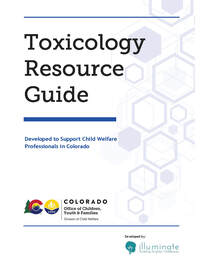Examples
LSD, PCP, Ketamine and associated analog drugs
Routes of Use
ingestion (sublingual), inhalation, intranasal
Observed Symptoms
Prenatal Exposure
Risks for low birthweight, irritability, potential neurodevelopmental impact
Breastfeeding
Data on the presence of hallucinogens in breastmilk is very limited, and the effects on the breastfed infant are largely unknown. PCP has been detected in breastmilk, and is not recommended during breastfeeding.
LSD, PCP, Ketamine and associated analog drugs
Routes of Use
ingestion (sublingual), inhalation, intranasal
Observed Symptoms
- Adult: visual and auditory hallucinations, nystagmus, ataxia, sedation, slurred speech, psychomotor agitation, delirium
- Child: same
Prenatal Exposure
Risks for low birthweight, irritability, potential neurodevelopmental impact
Breastfeeding
Data on the presence of hallucinogens in breastmilk is very limited, and the effects on the breastfed infant are largely unknown. PCP has been detected in breastmilk, and is not recommended during breastfeeding.

Is it a hallucinogen or is it a mental health concern? Asking a family and their support network what mental health diagnoses they have can be beneficial in helping us to determine how to best plan with them. If no previous diagnosis exists, it still might be a mental health issue.
Hallucinogens often come with other signs and symptoms like slurred speech. If you’re on the fence, a toxicology test or consult with a mental health professional might help, but in the meantime, make a plan with the family to ensure safe caregiving for the kids.
Hallucinogens often come with other signs and symptoms like slurred speech. If you’re on the fence, a toxicology test or consult with a mental health professional might help, but in the meantime, make a plan with the family to ensure safe caregiving for the kids.
Urine
Many urine drug screens will evaluate for LSD and PCP, and can be positive for up to 3-4 days after acute use. However, Ketamine and Dextromethorphan (found in cough medications), will cross react with PCP. There is no routine testing available for Peyote. A confirmatory test for unexpected results and pediatric exposures is recommended.
Blood
Blood tests can be obtained to verify acute toxicity, although they are not routinely obtained as clinical examination and observation of behavior in conjunction with urine is typically sufficient.
Meconium
Assays available for various hallucinogens are limited with exception of PCP.
Umbilical Cord
Assays available for various hallucinogens are limited with exception of PCP
Hair
Assays are limited for Hallucinogens.
Many urine drug screens will evaluate for LSD and PCP, and can be positive for up to 3-4 days after acute use. However, Ketamine and Dextromethorphan (found in cough medications), will cross react with PCP. There is no routine testing available for Peyote. A confirmatory test for unexpected results and pediatric exposures is recommended.
Blood
Blood tests can be obtained to verify acute toxicity, although they are not routinely obtained as clinical examination and observation of behavior in conjunction with urine is typically sufficient.
Meconium
Assays available for various hallucinogens are limited with exception of PCP.
Umbilical Cord
Assays available for various hallucinogens are limited with exception of PCP
Hair
Assays are limited for Hallucinogens.

